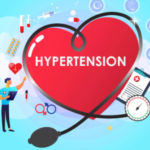A heart attack is a medical emergency, it occurs when blood clots blocks blood flow to the heart without blood tissue loses oxygen, and dies. The blockage is most often a build-up of fats, cholesterol, and other substances that form a plague in the arteries that feed the heart (Coronary artery).
Sometimes a plaque can rupture and form a clot that blocks blood flow, the interrupted blood flow can damage or destroy part of the heart muscle.
- Read also: Back Pain: Understanding back pains and health tips
- Blood pressure: Hypertension, causes and control
Symptoms
Heart attack symptoms vary, not all people who have it experience the same severity of symptoms. However, the more signs and symptoms you have, the greater the chances one is having a heart attack.
- Shortness of breath
- Sudden dizziness
- Fatigue
- Cold sweat
- Nausea
- Indigestion
- Heartburns or abdominal pains
- Pressure, pains, tightness, or squeezing and aching sensation in the chest or arm that spread to your neck, jaw, or back.
Causes
- Using tobacco and illicit drugs such as cocaine can cause a life-threatening spasm. Spasm is an attack of a coronary artery that shuts down blood flow to parts of the muscles.
- High cholesterol and fatty deposits
- Infectious diseases like COVID- 19 may also damage the heart in ways that result in a heart attack.
Risk factors
Factors contributing to the unwanted build-up of fatty deposits (atherosclerosis) that narrows arteries throughout the body.
- High blood pressure: over time high blood pressure can damage arteries that lead to the heart. High blood pressure that occurs with other conditions like obesity, high cholesterol, diabetes increases the risk of a heart attack.
- Age: men at the age 45 or older and woman at the age 55 or more are likely to have a heart attack than younger men and women
- Inflammatory disease: Rheumatoid arthritis, lupus and both can increase the risk of heart disease that leads to a heart attack.
- Family history of early heart disease: This appears to be a greater risk factor in women than in men.
- High cholesterol and triglycerides levels: a high level of low-density lipoprotein cholesterol (bad cholesterol) is most to narrow arteries. A high level of triglycerides a type of fat related to your diet also increases the risk of a heart attack.
- Diabetes: patients suffering from diabetes are most likely to develop heart disease also because diabetes can change the way you feel pain, in this condition one is at higher risk of having a silent heart attack without symptoms
- Inactive: The lack of physical activity is a major risk factor for heart disease, some research has found women to be less active than men.
Prevention
- Maintain a healthy weight
- Don’t smoke
- Limit alcohol
- Get a regular exercise
- Manage stress
- Eat a healthy diet
- Control your blood pressure
- Keep your cholesterol and triglycerides levels under control
- Manage diabetes
- Make sure to get enough sleep always.
In conclusion, it is never too late to take steps to prevent or control a heart attack even if you already had one. Although some risk factors such as age and family history cannot be controlled, you can take steps to lower the risk by changing the factors you can control. Taking medicine can also reduce the risk of a subsequent heart attack after the first and help your damaged heart function better.
My kindly advice is to regularly monitor your blood pressure, sugar levels, and cholesterol. Avoid stress because your mind responds to stress in ways that can increase your risk of heart attack and
increasing your blood pressure. Always see a doctor because close monitoring is essential.
By; Peace Chigozie























































